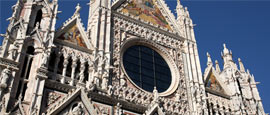Siena History
A vital commercial and banking centre, Siena was a regional powerhouse until pesky Florence took the crown.
Legend has it that Siena was founded by Senius, the son of Remus. You can see statues of a she-wolf suckling the mythical twin brothers throughout the city.
The truth is that Siena started life as an Etruscan settlement, later becoming a Roman colony called Sena Julia.
It was the Lombard kings who really brought Siena into its own however. By the 12th century, Siena was flourishing as an independent community.
Siena grew wealthy, as it was an important stop on the Via Francigena - the pilgrim route from France to Rome.
The influx of travellers and merchants led to the establishment of hostels, shops, a university and banking facilities.
Constantly at loggerheads with fierce rival Florence, Siena overpowered the Florentine army at the Battle of Montaperti in 1260.
The Ghibellines lost power soon after however, and outbreaks of the Black Death beginning in 1348 killed two-thirds of the city’s population.
Despite these setbacks, Siena continued to build fine piazzas, churches and towers, and in 1472, the powerful Monte dei Paschi Bank was established.
In 1487, Pandolfo Petrucci snatched power. He and his descendants ruled the city with an iron fist until, following a lengthy battle, Siena surrendered to Spain in 1555.
To Siena’s chagrin, Philip II of Spain handed the city over to arch rivals Florence a couple of years later.
In 1861, Siena was integrated into the newly formed Kingdom of Italy.
Today, the city is a thriving market town and tourist magnet, thanks to its beautiful medieval architecture and extraordinary art treasures.
Did you know?
• The Palio bareback horse races have been held in Siena since the mid-17th century.
• Monte dei Paschi Bank is the oldest surviving bank in the world.
• The Historic Centre of Siena was designated a UNESCO World Heritage site in 1995.
Do you have any Feedback about this page?
© 2026 Columbus Travel Media Ltd. All rights reserved. No part of this site may be reproduced without our written permission, click here for information on Columbus Content Solutions.




 You know where
You know where